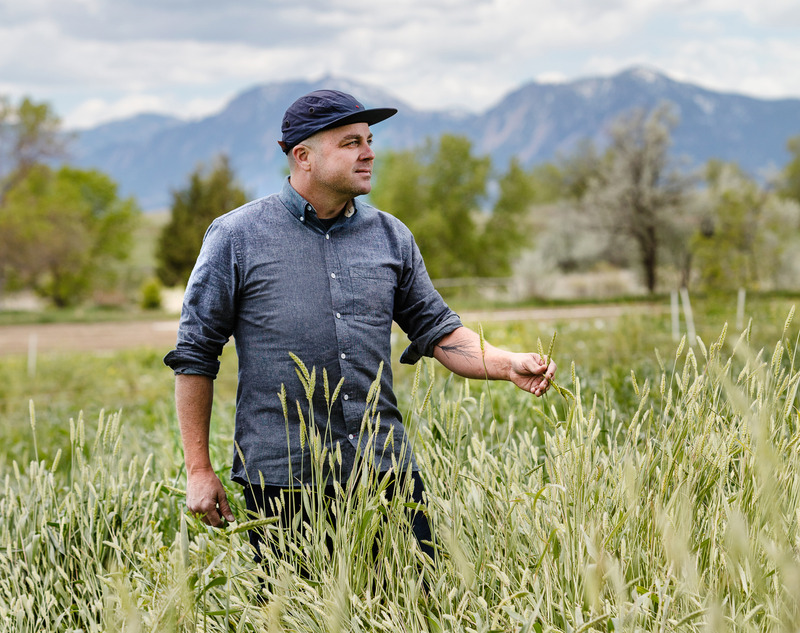The Local newsletter is your free, daily guide to life in Colorado. For locals, by locals.
The rolling hills of Boulder County spread before Kelly Whitaker like a ribbon as he strides across a field at local chef Eric Skokan’s Black Cat Farm. He squints to block the sun, planting his black leather Nikes inches from what looks like a carpet of new grass poking up through the soil. These fledgling plants of emmer, spelt, and white Sonora—all heritage wheat varieties—represent Whitaker’s latest obsession. He shifts his gaze to the horizon. “See that farm over there?” he says, pointing to a ridgeline to the east. “That’s 800 acres of commodity wheat.” Whitaker’s eyes flash back to the tender shoots at his feet, which recall the bygone days of Colorado’s heritage wheat production. “Chefs have a voice; we can bring light to this subject.”
Whitaker is best known as the chef and owner of Basta, a popular Boulder restaurant that specializes in domestic ingredients and wood-fire cooking. Those who know Whitaker outside of the kitchen consider him a champion of the local food movement and a national thought leader: He’s a regular headliner on the chef circuit at fundraising events such as Chefs Up Front; he was recently asked to cook for Thomas Keller at the illustrious Bocuse d’Or’s victory party in Los Angeles; and he’s the Western mouthpiece for Chefs Collaborative, a 24-year-old national nonprofit dedicated to creating and supporting a sustainable food system. And when he recognizes a need—such as replacing commodity wheat with heritage varieties—he takes action.
Last summer, when his hunt to bring heritage grain into Basta’s kitchen turned up no local options, Whitaker co-founded a nonprofit, the Noble Grain Alliance, with Boulder renaissance woman and bread-baking virtuoso Mona Esposito. Their mission: Bring back local grain by promoting its farming, milling, and distribution in Colorado and by educating consumers. The duo will host seminars and formally debut Noble Grain at Slow Food Nations, the national culinary festival coming to Denver this month (for more about Slow Food Nations, turn to page 54).

Over the past decade, the locavore movement has encouraged consumers to eat what’s grown in season and harvested nearby. But until celebrity chef Dan Barber published The Third Plate, a pioneering look at global farming, no one paid much attention to grain. This was no small oversight: The U.S. Department of Agriculture estimates that in 2015 the average American consumed 133 pounds of wheat flour. Since the industrialization of farms in the 1950s and 1960s, most of the grains we consume have been grown on large plots of chemically dependent land. And of the thousands of varieties that once flourished in the United States, only a handful of types of high-yield wheat are now planted on a large scale, which means the crop has become a uniform, ubiquitous product. We’ve lost touch with grains as foods that have inherent senses of place and terroir, nutrition and use. “There was no consideration for flavor when breeding [wheat]. It was bred out to make a shelf-stable product,” Esposito says. But with the Noble Grain Alliance and a handful of other entities around the country, including the Tehachapi Heritage Grain Project in southern California and Hayden Flour Mills in Arizona, Whitaker and Esposito are on a mission to restore and rebuild what’s been forgotten—and serve it to you for dinner.
Whitaker and Esposito consider themselves disciples of Nanna Meyer, an associate professor of health sciences at the University of Colorado Colorado Springs. Her courses integrate food culture and health with the real world, which ultimately led her to challenge—and persuade—the university to replace Sodexo’s food products in its dining halls with locally grown food. As Meyer sourced ingredients, she realized that Colorado no longer had much in the way of ancient or heritage grain. That led to conversations with farmers about setting up trials to grow strains, such as red fife and turkey red, that were once staple crops. With the university helping conduct these trials, Meyer now has small amounts of grain growing all over the state.
Some of these studies are tightly controlled; others are the work of garden hobbyists. Esposito has a small crop of Jones fife growing in front of her Boulder home, and Whitaker planted several varieties in Basta’s patio planters. Taken together, the experiment is to see which varieties grow best—as well as how they taste and how to cook with them. The latter part of the equation is critical, Meyer says, because there has to be demand for the harvest. “It’s the whole grain chain we want to bring together…the producer; the processor and miller; the baker, chef, and brewer; and the consumer.”
Jeff Cleary, owner of Grateful Bread Company in Golden, which goes through more than 15,000 pounds of flour every week, can attest to the importance of the whole grain chain. A couple of years ago, he installed an Austrian mill in his shop and began incorporating freshly milled, Colorado-grown grains into his breads. “Our customers noticed immediately,” Cleary says, “and kept asking, ‘What did you do differently?’ We could never go back.”
On February 17, for the Feast of Fornacalia—an ancient Roman holiday celebrating Fornax, the goddess of the oven—Whitaker and Esposito welcome more than 15 Colorado farmers and their families to lunch at Basta. Forty-year-old Whitaker pulls crisp-edged pizzas from the brick hearth oven; they’re made with turkey red and white Sonora flours that were milled in the restaurant’s kitchen the previous morning. “If you put one white flour next to another, there’s no difference. They’re flavor-neutral,” Whitaker says. “I’m looking at grain as a flavoring agent. There’s earth and bitterness and sweetness. It’s like being a sommelier and differentiating the flavor profiles.”

Nearby, a community table is packed with a who’s who of Colorado growers, including Black Cat’s Skokan, Ann Cure from Cure Organic Farm, Natalie Condon of Isabelle Farm, and “Farmer John” Ellis, who sits on the board of directors for the Boulder County Farmers Markets. They know one another and often trade advice—but rarely, if ever, do they sit down for a meal together. Whitaker and Esposito, along with Boulder seeds man Jared Hāgood of Lineage Seeds, who helped connect the group, quickly outline the mission of Noble Grain: to encourage farmers to grow local grain while simultaneously creating a demand from chefs and bakers. If that sounds like a simple solution to a widespread problem, it is. But it’s a start.
Whitaker and Esposito have expanded on Meyer’s model and, thanks to many of the farmers gathered at Basta, already have 17 acres of wheat growing in Boulder County. “Noble Grain has already done what it needed to do, which is get seed in the ground,” Hāgood says. “We took the university’s model and bumped it up. We’re not just trialing the crop; we’re trialing the relationships and the farmers to see if this is going to work.” For Noble Grain—or even Meyer’s trials—to see sustainable success at scale, there must be a community approach. The farmers can grow it, but there also has to be equipment to harvest it, places to store it, people to mill it, and consumers to buy it.
On a warm evening in mid-April, Whitaker is wearing dark jeans and his go-to charcoal denim button-down with the sleeves rolled up. The inky lines of a tattoo—a wild emmer stalk—peek beyond the cuff on his left arm. He’s one of five chefs cooking for the Conference on World Affairs after-party at the Food Lab in Boulder, and influencers such as celeb chef Rick Bayless and executive director of Slow Food USA Richard McCarthy are in attendance.
Whitaker is grilling chicken “spiedini” (Italian-style kebabs) over Japanese binchotan charcoal; it’s a test-run for his forthcoming restaurant in Sunnyside. The concept centers on skewer-style cooking—Japanese in nature, but with Italian flavors—and a robust grain program reflected in breads and whole-grain pasta. “There will be no flour other than what we mill,” Whitaker says. He’s already made the shift at Basta. “Anywhere there’s flour, which means béchamel and sauces, we use house-milled flour. We’re using pasayten white and turkey red for pizza, kamut for crackers. This is the next wave for Basta.”
Whitaker began grinding wheat at Basta about a year ago. Shortly thereafter, he was invited—along with Chris Bianco (Pizzeria Bianco in Phoenix), Corey Lee (Benu and In Situ in San Francisco), Chad Robertson (Tartine Bakery & Cafe in San Francisco), and Marc Vetri (Osteria, Amis, and Alla Spina in Philadelphia), arguably four of the most influential chefs in the country—to pilot a milling program called Cereal R&D. Although not connected to Noble Grain, the national project’s mission aligns with Whitaker and Esposito’s by striving to put a tabletop mill in every restaurant and bakery in the country so that each entity can grind its own (ideally locally grown) grains. It’s all about replacing the industry’s dependence on white flour with better-for-you, better-tasting grains that have stories to tell. “Much like wine or coffee, you really get a sense of place,” Esposito says of baking with freshly milled grains. “You may find nutty or grassy flavors are more or less forward depending on the growing conditions and the particular farmer or place it has been grown.”
On April 25, Whitaker, again dressed in his favorite uniform but with new gray canvas Nikes for the occasion, steps onto the stage of the StarChefs Rising Stars gala at City Hall in Denver. He’s collecting two awards. The Community Chef award honors Whitaker for being a “catalyst for getting other members of the culinary community involved in local and/or national events and organizations.” But it’s the Game Changer prize that Whitaker cherishes most, as it honors a chef who is “boldly advancing the restaurant industry—whether it’s through boundary-pushing cuisine, an innovative dining format, or a revolutionary business idea.” With Noble Grain, as with all of Whitaker’s projects, his intention isn’t showy or loud. It’s understated—and it always returns to cooking.
Back in Boulder, pointy green leaves wave above the rims of wooden planters on Basta’s patio. These are the first glimmers of Whitaker’s personal wheat trial. Last fall, Whitaker and his staff planted the seeds for black emmer, banatka winter, and loft house wheat. So far, Basta’s urban crop appears to be a success, if on a tiny scale. “We might only be able to make one Parker House roll,” Whitaker says with a laugh, “but it’ll be the most amazing roll ever.”
Amanda M. Faison is a 5280 contributing editor. Email her at letters@5280.com.









